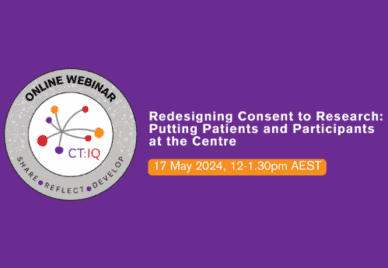
Redesigning Consent to Research: Putting Patients and Participants at the Centre
Go to partner eventabout Redesigning Consent to Research: Putting Patients and Participants at the Centre
Australian brain cancer patients could be missing out on optimal treatment and survival outcomes — due to an absence of data.
In order to improve care and survival rates, researchers need to have access to an array of critical data, including detailed medical histories, surgery specimens and patient outcomes.
Currently there is no easy option for capturing, storing and sharing this crucial data.
However, a team of Australian researchers is leading the way to solve this problem.
Brain Cancer Biobanking Australia (BCBA) wants to provide researchers, clinicians, hospitals and government with easy access to relevant data to accelerate paediatric and adult brain cancer research and improve patient care.
“Specimens aren’t really useful unless we know the background of the patient and also what happened after surgery,” said Associate Professor Lindy Jeffree, of BCBA.
In 2018 BCBA initiated a project to create a national, easily accessible data collection to address variations in patient care, provide missing data on biospecimens for research and allow researchers to create clinical trials based on prospective data from real world clinical settings. The Australian Brain Cancer Clinical Registry Project aims to help determine the efficacy of existing and new brain cancer treatments and reduce variations in care across Australia. The ultimate goal is to optimise the quality of life and survival of brain cancer patients.
“Data is the key to research,” said Robyn Leonard, Director of BCBA. “There’s no data on brain cancer patterns of care; what treatment patients are getting and where.”
At the present time, if researchers or clinicians have a new drug they want to test, accessing relevant data is quite difficult.
“There aren’t many survivors from brain cancer and not much funding,” Lindy said.
The project received support in 2019 through the Australian Research Data Commons (ARDC) Discovery activities.
It established a multi-disciplinary, multi-institutional expert working group of clinicians. The group created a preliminary set of clinical indicators for the registry, based on a literature review. These indicators are being used to establish a definitive set of indicators for data collection across the entire patient journey. The registry will also focus on making data FAIR.
The project resulted in collaborations with CSIRO E-Health Research Centre and Cancer Alliance Queensland. Plans are now underway to implement a pilot study to test the electronic extraction of clinical data.
“What we’re trying to do is collect information electronically. It’s at the cutting edge of what’s achievable,” said Lindy.
“We also need to collaborate internationally. Brain cancer is divided into so many sub-types that we will never have enough samples and associated data in Australia to power the type of research that is going to achieve real breakthroughs in survival,” Robyn said.